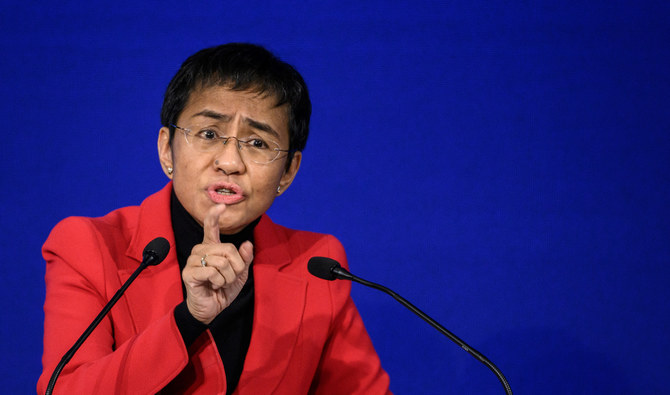MANILA: Philippine journalist and Nobel Peace Prize laureate Maria Ressa vowed on Wednesday to fight a government order to shut down her online news site Rappler, known for its tough scrutiny of Filipino President Rodrigo Duterte.
The order, issued by the Philippines’ Securities and Exchange Commission on Tuesday, affirmed the corporate regulator’s 2018 decision to revoke the certificates of incorporation of Rappler over what it said was a breach of the ban on foreign ownership of media outlets.
The ruling came as Duterte was set to complete his six-year presidential term on Thursday and hand over power to President-elect Ferdinand Marcos Jr.
“We are entitled to appeal this decision and will do so,” Ressa said during a press conference. “We will continue to work. It is business as usual. We will follow the legal process; we’ll continue to stand up for our rights.”
Ressa, who last year became the first Nobel laureate from the Philippines — sharing the prize with Russian journalist Dmitry Muratov — was recognized by the Norwegian Nobel Committee for efforts to safeguard freedom of expression and her work and criticism of the Duterte regime’s “controversial, murderous anti-drug campaign,” an antidrug policy that since 2016 has led to the deaths of thousands of Filipinos, mostly urban poor, and drawn international condemnation.
She told reporters the corporate regulator’s decision to shut down Rappler was “political tactics.”
“Over the last six years, we have been harassed,” she added. “We’re not going to voluntarily give up our rights. And we really shouldn’t. I continue to appeal for that. Because when you give up your rights, you’re never going to get them back.”
Ressa co-founded Rappler in 2012. Since Duterte took office in 2016, he has openly slammed journalists and publications criticizing him and his war on drugs campaign.
In 2018, the SEC ruled that Rappler violated foreign equity restrictions on domestic media when it sold depositary rights to a foreign entity.
Rappler argued the Omidyar Network, the philanthropic arm of eBay founder Pierre Omidyar, was a silent investor. Omidyar later announced donating the depository receipts to Rappler’s staff to resolve foreign ownership issues.
The news outlet’s chief legal counsel, Francis Lim, said they had two weeks to file a petition for review of the shutdown decision before the Court of Appeals.
“There are powerful, factual, and legal grounds to reverse the SEC decision,” he told reporters. “It’s not the end of the world for us. There’s still a very long process to go.”
The shutdown announcement sparked an outcry among local journalists.
The National Union of Journalists of the Philippines called on its members to stand together against attempts to silence the media.
“Throughout the six years of the Duterte administration, we have seen lawsuits and regulatory processes used as tools to muzzle the press,” the union said in a statement. “It is clear now, if it had not been clear before, that the journalism community and the communities that we report about and for must stand together against government moves to harass, restrict, and silence any of us to keep the press free for all of us.”
The Philippines ranks 147th out of 180 countries in the 2022 World Press Freedom Index, after having dropped in the ranking each year from 133rd in 2018.
Human Rights Watch said in a statement that Rappler was “facing government retaliation for its fearless reporting about rights abuses.”
“This is an effort to shut up Nobel laureate Maria Ressa, and shut down Rappler, by hook or by crook,” HRW Deputy Asia Director Phil Robertson said. “It’s entirely predictable that the SEC would bend over backwards to interpret rules in a way that would enable them to take Rappler down while spuriously claiming that this is a normal regulatory action.”




























